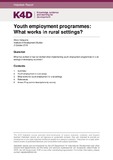| dc.contributor.author | Hatayama, Maho | |
| dc.date.accessioned | 2018-12-10T10:12:02Z | |
| dc.date.available | 2018-12-10T10:12:02Z | |
| dc.date.issued | 2018-10-03 | |
| dc.identifier.citation | Hatayama, M. (2018). Youth employment programmes: What works in rural settings? K4D Helpdesk Report 468. Brighton, UK: Institute of Development Studies | en |
| dc.identifier.uri | https://opendocs.ids.ac.uk/opendocs/handle/20.500.12413/14168 | |
| dc.description.abstract | Youth employment challenges are much more severe in rural areas than urban areas in developing countries. This rapid review looks at available evidence on the extent to which youth employment interventions work in rural settings, particularly in terms of employment creation for rural youth. Very little evidence is available on the effectiveness of individual employment interventions in rural settings, but the evidence shows that skills training interventions - the most widely used youth employment programmes - have worked to improve employment outcomes of rural youth. Key findings relating to supply-side employment interventions include: Skills training, particularly when combined with other interventions such as life skills development and internship, increased employment and earnings outcomes among rural youth. Skills training alone might have limited positive outcomes; Employment matching services, including job fairs, improved employment and earnings outcomes in rural areas; Providing incentives for job searches, such as lowering transport and migration costs, show positive employment and income effects for rural youth. Key findings relating to demand-side employment interventions include: There was little evidence to evaluate the effect of financial support interventions on employment outcomes. Only one impact evaluation study on microfinance schemes was found, which showed no effect on employment creation for existing small firms in rural settings; An individual study showed the positive effect of business development services on business creation and earnings of rural businesses. There were limited studies on the causality between business support services and employment outcomes in rural settings; Wage subsidy interventions and public employment services showed positive employment outcomes for rural populations. These interventions also provided opportunities to disadvantaged rural youth for skills formation and increased their employability. Key findings relating to entrepreneurship promotion interventions include: Overall, entrepreneurship programmes, mainly financing and business skills training, had positive impacts on rural start-ups. Finance is a critical determinant for business creation for rural youth. The interventions were effective when targeting poor and disadvantaged young people; Technical and vocational training increased business start-ups for rural youth only if they were combined with financing; The combination of business skills training with business advisory services and financial support led to positive effects on self-employment in rural settings. Overall, there is a significant lack of evidence about what works to support rural youth employment. There are few rigorous evaluations of rural programmes relative to the increasing number of such initiatives. Only a few studies disaggregate the findings by location. Differences in content, length and intensity of the interventions in different local conditions all make it difficult to reach a consensus regarding how effective each intervention is. There are also many other interventions and policies that affect labour market outcomes such as infrastructure development and regulatory reforms, which have significant methodological challenges for evaluations to establish causality with job creation outcomes. Therefore, the results cannot be generalised and early findings on what works are inconclusive. | en |
| dc.language.iso | en | en |
| dc.publisher | IDS | en |
| dc.relation.ispartofseries | K4D Helpdesk Report;468 | |
| dc.rights.uri | https://www.nationalarchives.gov.uk/doc/open-government-licence/version/3/ | en |
| dc.subject | Children and Youth | en |
| dc.subject | Rural Development | en |
| dc.subject | Work and Labour | en |
| dc.title | Youth Employment Programmes: What Works in Rural Settings? | en |
| dc.type | Other | en |
| dc.rights.holder | © DFID - Crown copyright 2018. | en |
| dcterms.dateAccepted | 2018-10-03 | |
| rioxxterms.funder | Department for International Development, UK Government | en |
| rioxxterms.identifier.project | K4D | en |
| rioxxterms.version | VoR | en |
| rioxxterms.funder.project | 238a9fa4-fe4a-4380-996b-995f33607ba0 | en |

